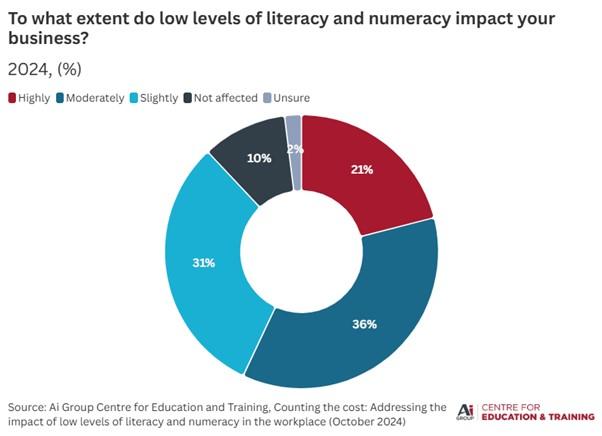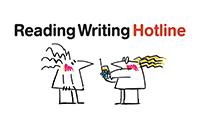
10 Jun The impact of literacy and numeracy gaps in the workplace
The Hotline receives a significant number of calls from employees who highlight the increased literacy demands and changing technology they are experiencing in their jobs.
Literacy Links reached out to Dr Caroline Smith, Executive Director, Centre for Education and Training at the Ai Group to discuss literacy issues from an industry perspective. Caroline is a senior leader specialising in future skills, employment and economic policy.
The Ai Group has long had a strong focus on enhancing language, literacy and numeracy skills – as well as digital skills – in the workplace.
- How does the AiGroup learn about literacy and numeracy challenges in the workplace?
The Centre for Education and Training conducts a workplace skills survey of employers every two years. We ask questions about levels of literacy and numeracy and implications for workplace productivity. For more than a decade we have found that businesses report low literacy and numeracy impacting on their business, regardless the size of the company.
In 2024, 88% of companies reported being affected by low levels of literacy and numeracy – to a high, moderate or slight degree.

For more information on Ai Group Centre for Education and Training’s work on foundation skills, you can go to Counting the Cost: Addressing the impact of low levels of literacy and numeracy in the workplace. Also view the accompanying webinar and blog. You may also be interested in this introductory webinar produced by the CET in 2021.
- What is the impact of low literacy and numeracy from a business perspective in the workplace? How does low literacy and numeracy affect workplace productivity, inclusion and work health and safety?
Our most recent research shows that low levels of literacy and numeracy impacts a range of areas for businesses, for example:
- 63% of companies report poor completion of workplace documents or reports
- 55% of companies report time wasted
- 49% of companies report staff are lacking confidence and unwilling to take on new work.
- 47% of companies are experiencing teamwork and communications problems.
- 27% of companies agree that work health and safety issues could arise where low levels of literacy and numeracy are a barrier to compliance and safe work practices.
- What are the issues around digital literacy in the workplace?
Ai Group’s research has found that digital literacy is now a baseline requirement for staff – from managers and professionals through to trades and technicians. Foundational digital skills and competencies are rated as one of the most in demand digital skills capabilities in the workplace, after the more immediate skills need of cyber-security. This includes tasks like sending an email, locating a file on a computer, or sending a text message.
We also know that skills needs within firms are rapidly changing. The Centre for Education and Training is the local partner for the World Economic Forum’s Future of Jobs Report 2025. That research shows that in the five years between 2025 to 2030, the average worker can expect about 40% of their existing skills to be transformed or become outdated.
With the rapid pace of change in technology, it’s important that more is invested in building skills at the foundational level to ensure everyone has the ‘learning to learn’ skills required in the modern economy, especially one increasingly driven by cloud computing, the internet of things, artificial intelligence, and social media.
- What are the barriers in the workplace that prevent people from participating in improving their literacy, numeracy and digital literacy?
One of the more common types of feedback we hear from companies is where do we begin?’ Knowing where to go for help is often the first barrier. Approaching your local TAFE, Learn Local (if you are in Victoria), or Reading Writing Hotline can be a great first start. There are federal and state programs that can support, including Skills for Education and Employment (SEE). If finances are a barrier, Ai Group has conducted research showing that when employers invest in literacy and numeracy, there is a return on investment.
- There is a lot of focus on improving the reading and writing skills of employees. What do you see are some of the things that employers could do to address the literacy demands placed on their workers?
Firstly, we need to ensure that staff feel supported if they have low levels of literacy and numeracy. Destigmatising the topic will create an environment where people feel they can learn and grow. Discretion is important; no one wants to be made to feel inadequate in front of others, and maintaining a person’s dignity will not diminish their self-esteem. A confident and respected learner goes much further.
Additionally, companies can encourage a culture of continuous and lifelong learning. Skills are not static and must evolve with the times. In such an environment you can often find a company’s workforce development plan, which emphasises the importance of education and training, and a strategy for lifting the skills, knowledge and productivity through strategic investments.
Finally, utilise government funded programs which may provide flexible training arrangements, including in a workplace or vocational setting.
- What are the features of literacy, numeracy and digital literacy programs that are effective in the workplace?
Learning in context is really important. Understanding how literacy and numeracy relates to specific tasks, functions and jobs in a workplace provides meaningful context to learners.
Providing greater opportunities for work-contextualised learning would be my number 1 ask when it comes to developing foundational skills. This approach really helps to avoid the stigma that can come with literacy and numeracy issues – and at the same time helps to upskill in other areas of business need.
- Is there any advice that you could give to employers who feel that literacy and numeracy is an issue in their workplace.
Taking action is better than not taking action. The earlier you act the sooner you can start lifting productivity. There can also be great benefits for culture and team morale.
Talking to the Reading Writing Hotline or to your local TAFE is a great start.


